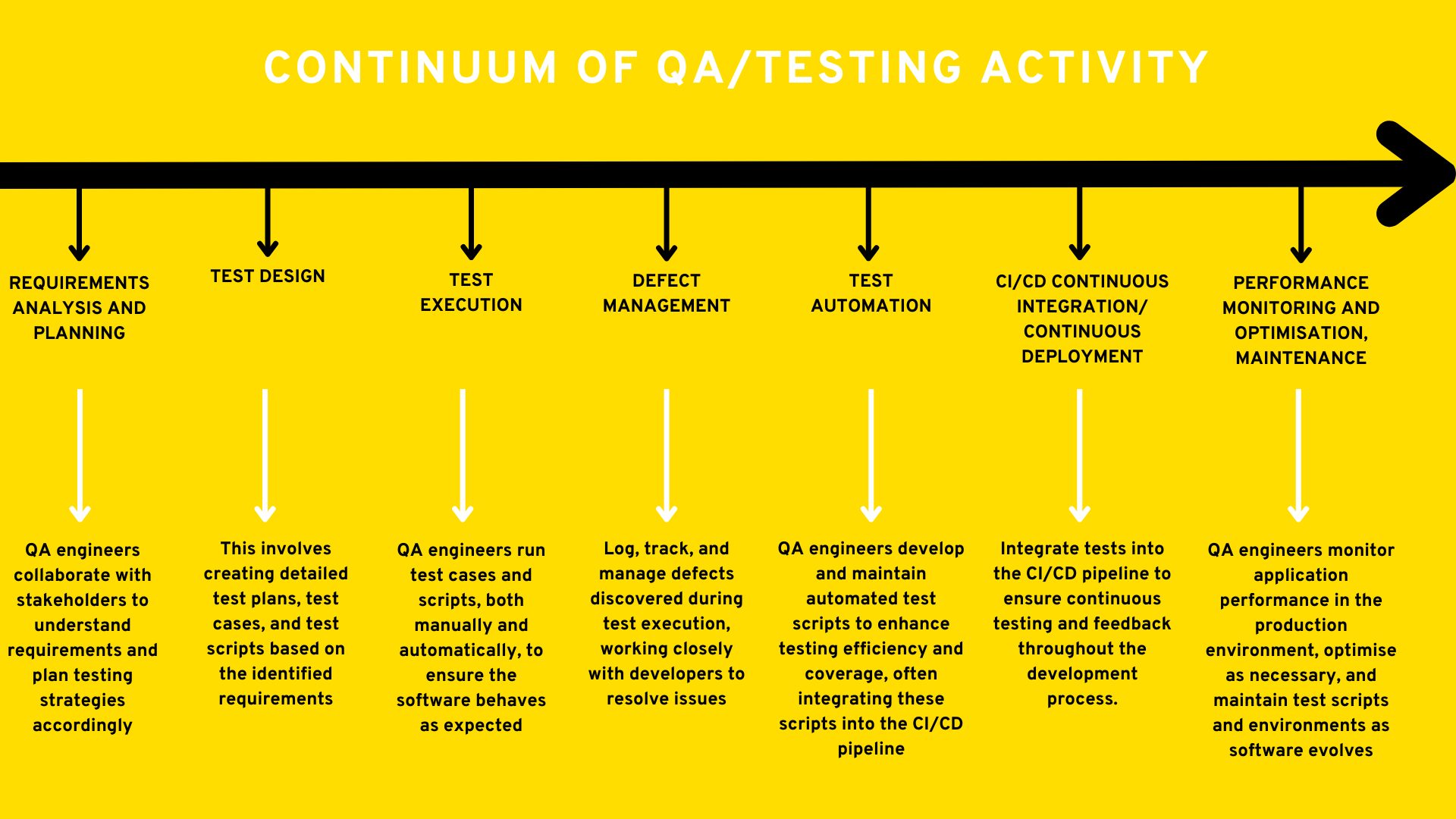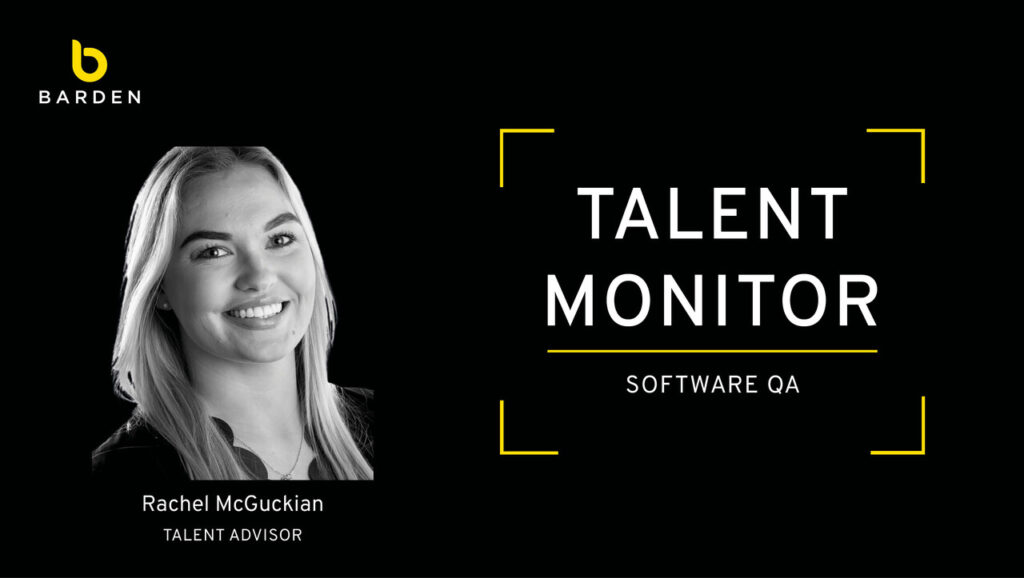In the ever-evolving software development landscape, Quality Assurance (QA) is a vital component embedded in every phase of the Software Development Life Cycle (SDLC). Ensuring the reliability, functionality, and excellence of software products, QA is fundamental to successful software engineering.
Ireland continues to solidify its position as a prominent tech hub, attracting multinational corporations due to its supportive innovation ecosystem. This influx has also sparked the development of indigenous startups. Amidst this growth, the software QA role has become increasingly important, ensuring that both multinational and homegrown companies deliver reliable, high-quality software products.
After engaging with a diverse group of software testers, let’s explore some key insights, emerging trends, and important factors in the industry.
#1 Software QA Landscape
The continuum of work for a QA engineer reflects the balance of activities they engage in throughout the SDLC. This balance can vary significantly from one company to another. For instance, in some organisations, QA engineers may take on broader responsibilities including leadership and managerial duties, whereas in larger multinational companies, their roles may be more specialised.
Here are the key points that outline this continuum:

Understanding this continuum of testing activity is essential, as it illustrates the varied and complex nature of the QA engineer’s role. It emphasises the importance of context when discussing roles and corresponding salaries.
#2 Variables
Job titles in software QA and test automation can be misleading without context. They don’t fully define your role or market value. Several key factors influence a QA tester’s value, highlighting the role’s scope and the diversity of experience. Here are the ones that tend to matter the most:
- Team and Company Size:
In smaller teams within local companies, individuals often have wider responsibilities across various testing domains. For instance, in a multinational corporation, a QA Engineer might specialise in performance testing for a specific product line. Conversely, in a startup environment, the same role could involve overseeing performance, security, and usability testing across all company products.
Similarly, the responsibilities of test leads expand in larger teams. As they manage and mentor more engineers, their leadership and oversight duties increase significantly.
Another point to consider here is that QA teams collaborate closely with developers, product managers, and other stakeholders. Effective communication and teamwork lead to better outcomes and provide valuable exposure to cross-functional dynamics.
- Scope of Responsibilities:
Roles evolve with experience and seniority. Junior and senior QA engineers typically focus on hands-on testing tasks, while those at lead levels are expected to bring leadership and strategic oversight to testing initiatives. Companies value QA engineers who can navigate both technical intricacies and project management challenges.
Consider a senior QA engineer transitioning to a lead role. Their market value increases not just because of technical proficiency but also due to their ability to steer testing efforts across complex projects.
- Project Complexity and Automation:
As projects grow in complexity, so do the testing strategies required. Larger initiatives often rely on robust automation frameworks, making proficiency in tools like Selenium, Appium, Jenkins, and TestNG highly valuable. Most automation testers specialise in a limited set of tools, given their depth and complexity. In contrast, those with only manual testing experience may find fewer opportunities as automation becomes more widespread. As of Q3 2025, low-code/no-code testing tools are gaining traction.
- Cloud Technologies and Testing:
Cloud platforms offer scalable and flexible testing environments that are integral to modern QA practices. Experience with leading providers like AWS, Azure, and Google Cloud – especially when it comes to testing distributed systems and serverless architectures – is highly valuable. QA engineers who are also skilled in cloud-specific testing, such as API and microservices testing, bring added versatility and impact to their teams.
- Web and Mobile Application Testing:
Versatility across different platforms—web and mobile—significantly enhances a QA engineer’s adaptability. Companies seek professionals who can navigate the nuances of testing on various devices and operating systems.
For instance, a QA engineer experienced in cross-platform testing might oversee the launch of a new mobile app, ensuring it performs flawlessly across iOS and Android devices.
In summary, a QA professional’s worth in the market is shaped by their ability to navigate these variables effectively. Proficiency in automation, cloud technologies, and diverse testing environments not only broadens their scope but also positions them as invaluable assets capable of driving quality and innovation within their organisations.
#3 Base Salary
In this article, we have not used specific base salary ranges due to the multitude of variables discussed in #2. Understanding the context and specific variables is important, as using salary ranges without this information would be misleading. Salaries vary significantly based on expertise and what the company in question needs.
Those with advanced skills in automation, mobile, or cloud testing are typically highly sought-after by companies. In summary, without a clear understanding of these factors and where a role falls on the continuum, any given salary range associated with job titles wouldn’t be accurate.
Here’s an example of some recently delivered assignments:
- MNC – Cork – QA Manager: €100,000 – €110,000
- MNC – Dublin – Software Test Lead: €95,000 – €110,000
- MNC – Dublin – Senior QA Automation Engineer: €90,000 – €95,000
- Tech Startup – Dublin – Senior QA Automation Engineer: €80,000 – €90,000
- MNC – Dublin – QA Engineer (manual & automation): €65,000 – €75,000
- MNC – Munster – Manual Tester (Mobile Apps): €55,000 – €60,000
- Small Fintech Company – Cork – Junior Software Tester: €36,000 – €40,000
If you would like to discuss a salary range bespoke to your role and location, simply contact Rachel at rachel.mcguckian@barden.ie to chat in more detail.
#4 Current Snapshot of the Software QA Talent Pool
Here’s what we’ve noticed this quarter in the Software QA talent pool in Ireland:

#5 Projected Challenges for the Next 12 Months
For Employers:
- AI Integration: As AI becomes embedded in more products, employers face the challenge of ensuring their QA teams can validate AI-driven systems while also adopting AI-assisted testing tools effectively.
- Full-Lifecycle Testing: Shift-left testing remains a core best practice for catching issues early in development, but testing in production (shift-right) is becoming more important. QA teams must balance both approaches to ensure quality throughout the entire SDLC. How these practices are applied depends on factors like industry needs, release speed, and risk tolerance.
- Security and Performance: Regulatory demands and user expectations mean performance and security testing can no longer be optional. Building QA teams with baseline expertise in these areas is critical.
- Cloud-Native Testing: The rise of cloud technologies means QA teams must adapt to testing in dynamic, distributed environments like microservices and serverless architectures. Employers face challenges ensuring test automation and monitoring tools effectively cover these complex systems.
For Talent:
- AI and Automation Upskilling: QA engineers will need to actively learn and apply emerging tools and techniques – particularly in AI-assisted testing, prompt engineering, and continuous test automation.
- Broader Responsibilities: As QA roles expand across pre- and post-release phases, testers are expected to work more cross-functionally with development, DevOps, and data science teams – requiring both technical versatility and soft skills.
- Cloud Skills and Testing: QA engineers should actively seek opportunities – whether through work projects, training, or self-learning – to build expertise in cloud platforms and cloud-native testing methods such as containerised testing, API testing for microservices, and automated monitoring. Developing these skills is essential to meet the growing demand for cloud environment testing, even if current roles don’t fully support it.
In Barden, we understand that each team, role, and requirement is unique. If you would like to discuss what tactics and approaches that would suit you, please feel free to contact Rachel McGuckian our Software QA Talent Advisory & Recruitment expert here in Barden (rachel.mcguckian@barden.ie); we’re where leaders go before they start looking for Software QA talent.
This information is accurate as per July 2025 and will be updated periodically. Data sources include Barden Proprietary Data, LinkedIn Analytics and other 3rd party data sources. If you have a request and would like real-time information to inform your hiring decisions contact Rachel McGuckian at rachel.mcguckian@barden.ie.


 Jump Back
Jump Back

